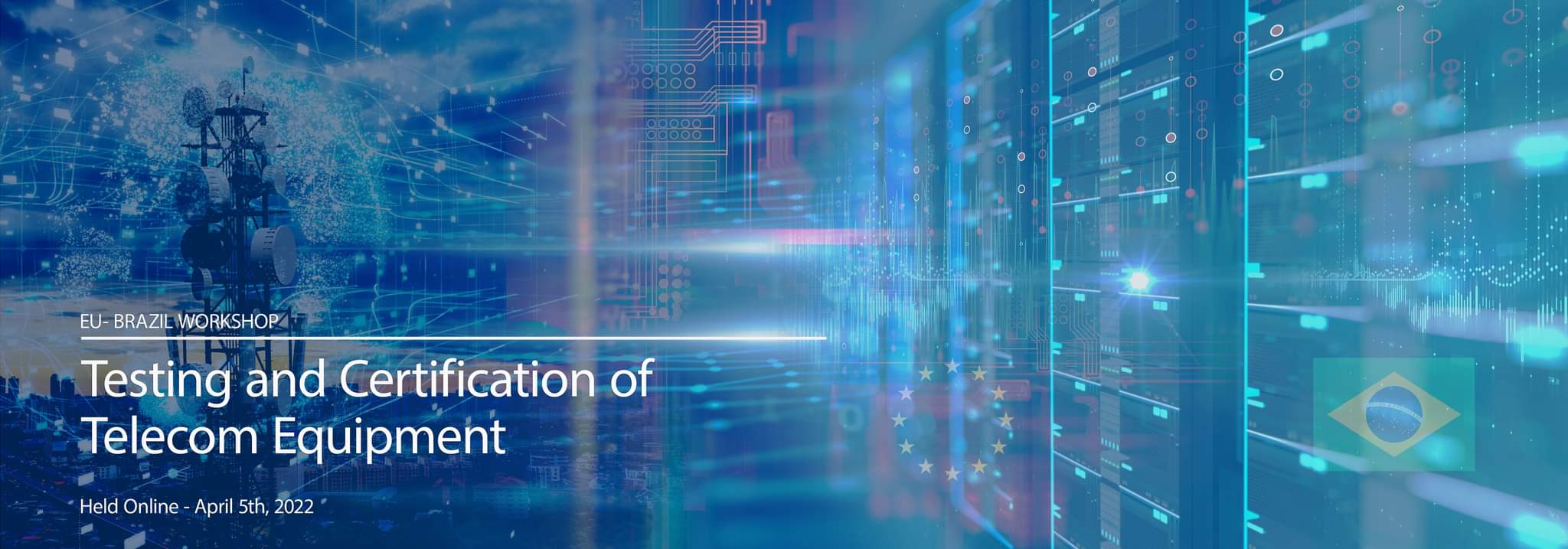
On April 5th, 2022, the European Commission (DG CONNECT) and ANATEL from Brazil gathered selected experts for a knowledge sharing exchange on the Testing and Certification of Telecom Equipment. The event was organized in the context of the InDiCo project and took place online with the support of ENISA and ETSI in Europe and CPQD in Brazil.
During the workshop, the EU and Brazil expressed the desire to further strengthen and broaden their cooperation in the field of Testing and Certification of telecom equipment, with frameworks and practices being detailed with a view to better understanding respective policies. Experts from both regions exchanged views and explored the possibility of increased alignment of market access requirements between Brazil and the European Union.
The following areas were covered:
- Requirements and procedure for mandatory testing and certification of telecom equipment in Brazil
- European system for testing and certification of telecom Equipment
- Current state of play in Brazil and Europe
The workshop was co-chaired by:
- Carlos Oliveira, Delegation of the European Union to Brazil,
- Tonnie De Koster, Adviser for the International Aspects of Digital Transformation (European Commission, DG CONNECT),
and - Tais Maldonado Niffinegger, Head of International Affairs from ANATEL.
The programme featured the following speakers from Europe and Brazil, representing public authorities, regulatory bodies, standard-setting bodies as well as implementing organizations.
- Emilio Davila-Gonzalez (European Commission DG CONNECT), Head of ICT Standardization Sector presented the main stakeholders, principles, and regulations applicable in Europe.
- Dr. Andreas Mitrakas (ENISA, Head of Unit, Market, Certification & Standardization) presented the EU Cybersecurity Certification Framework.
- Davison Gonzaga (ANATEL, in charge of Certification and Homologation of Telecom Equipment in Brazil) presented the conformity assessment and approval process of Telecom Products in Brazil.
- Luciano Coelho Derze (CPQD, Certification Manager) presented the Standards, Testing and Certification principles applicable in Brazil.
The importance of harmonized and fair market access requirements was highlighted by all the parties during the workshop. The main high-level differences and commonalities were identified and discussed by the parties.
Among the commonalities identified was the fact that both regions are using Designated Certification Bodies (named Notified Bodies in Europe and Certification Bodies in Brazil). These organizations carry out conformity assessment procedures, which are set out in the applicable legislation, to ensure the conformity of telecom products before they are placed on the market.
One promising area of cooperation, that has the potential to further streamline the introduction of telecommunication products in Brazil, was the option offered by the Brazilian legislation to connect or “peer” Brazilian Certification bodies with foreign laboratories, allowing for potential endorsement of certification results already obtained in Europe by laboratories accredited in Brazil. This approach would help establish trust between European and Brazilian organizations and reduce redundancy in testing and certification efforts which in the end affect end users through price and time to market increase.
One of the key differences identified was that Europe offers, in addition to the regular process of Test, Evaluation and Certification, a possibility of a self-assessment by the manufacturers themselves. In this context, the manufacturer is allowed to place a product on the market, as long as it complies with a standard (or a set of standards) that has been assessed by the European Commission to meet the requirement of the applicable legislation for the targeted product. As the standard demonstrates compliance to the legal requirements, the product implementing the standard benefits from what is called "presumption of conformity". In case of problems or due to random controls, a conformity assessment procedure can be conducted later. It was highlighted that this mechanism is not only available to European industry but also to any player intending to access the European Union market.
The parties also acknowledged the importance of building on common standards and identified that a review of the legislation and technical standards applicable in Europe and Brazil for Telecom Equipment was an important action to identify further areas where alignment could be sought.
Tonnie De Koster, Emilio Davila-Gonzalez from the European Commission (DG CONNECT), Carlos Oliveira from the Delegation of the European Union to Brazil and Davison Gonzaga from ANATEL agreed on the benefits and the importance of further cooperation exchanges. The workshop was seen as a helpful step ahead of the upcoming dialogues on Digital between the European Union and Brazil.